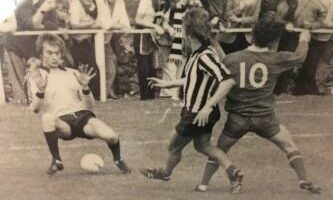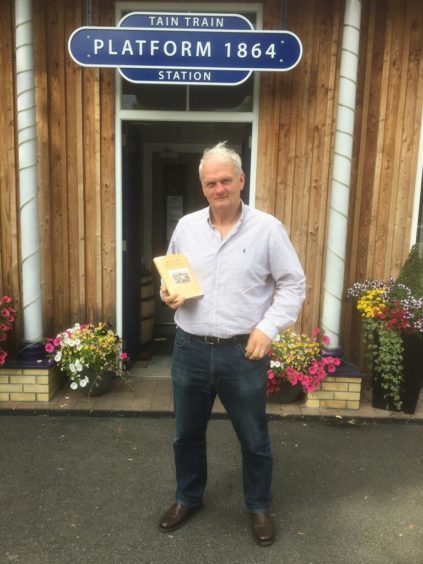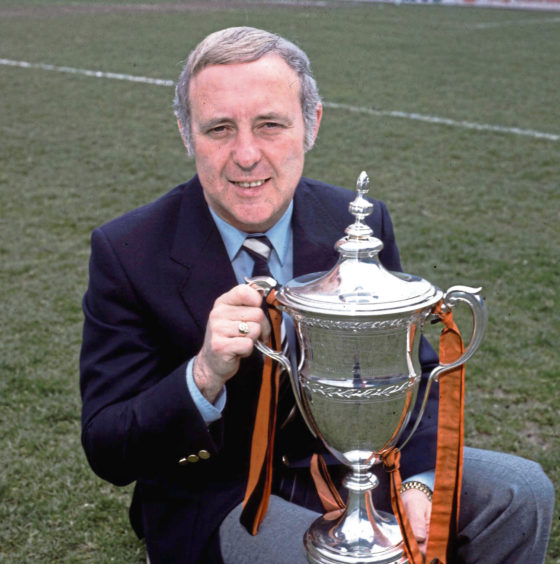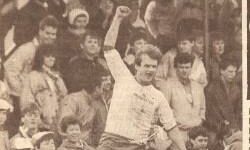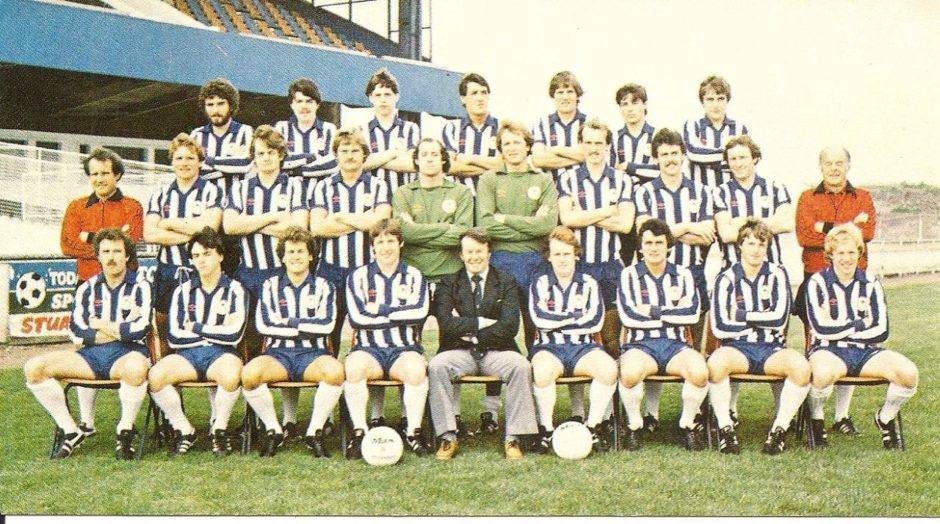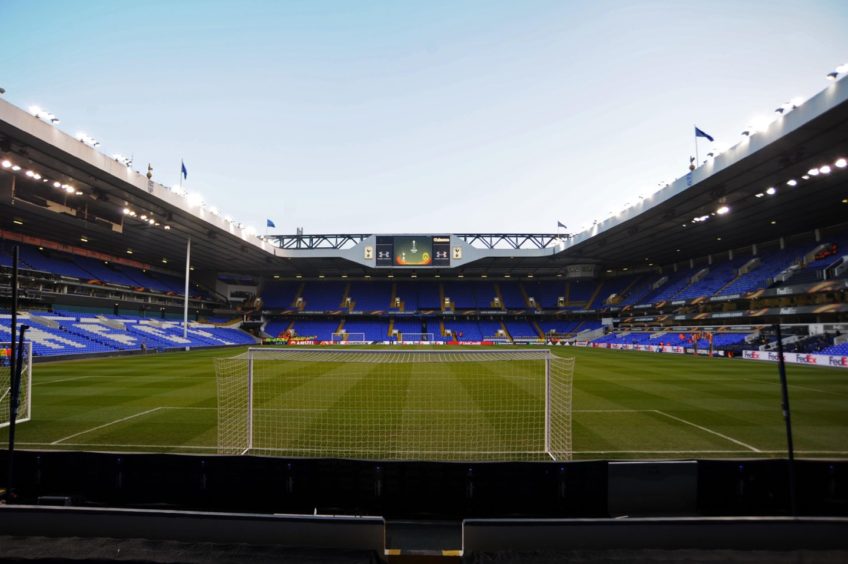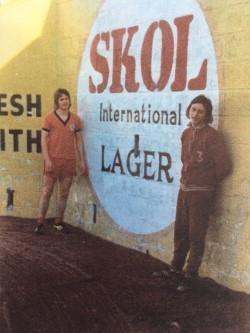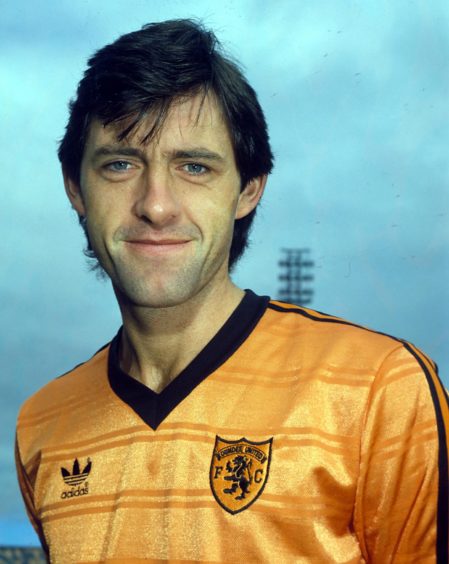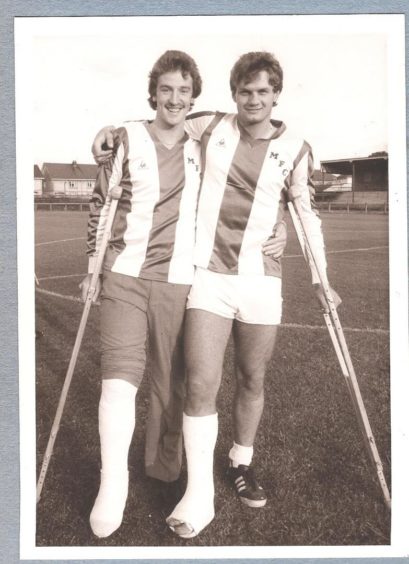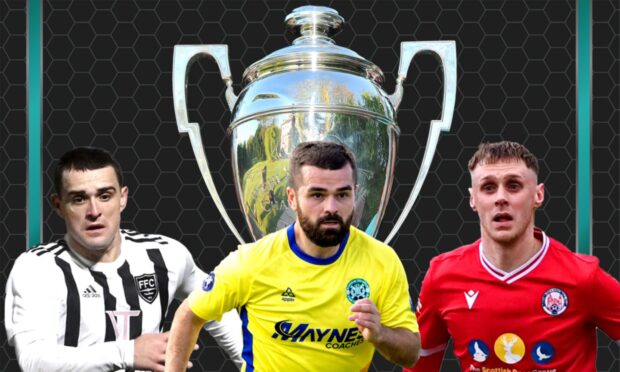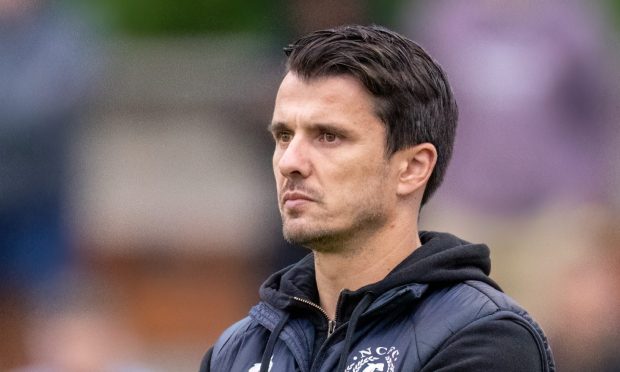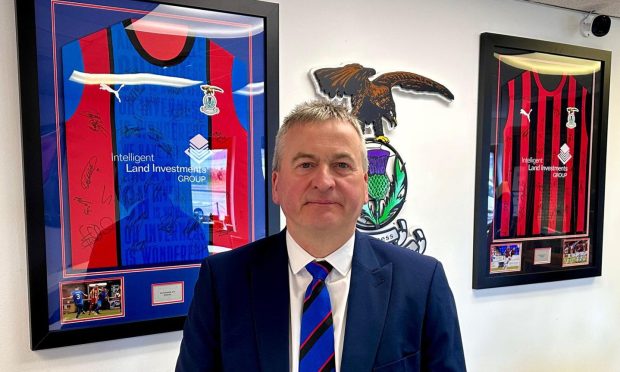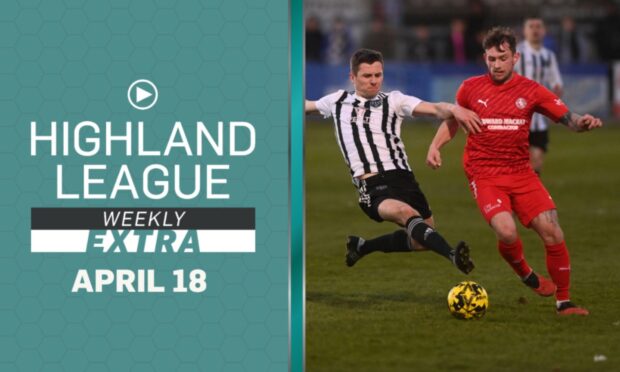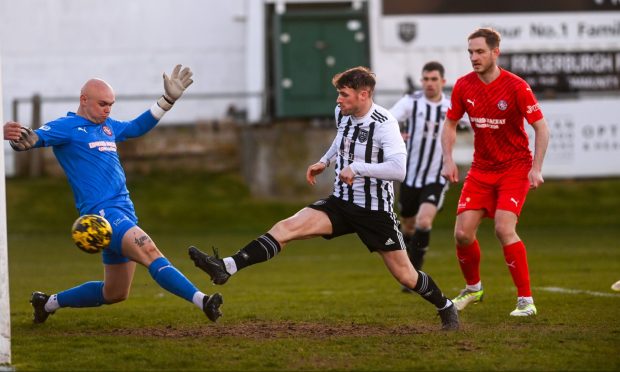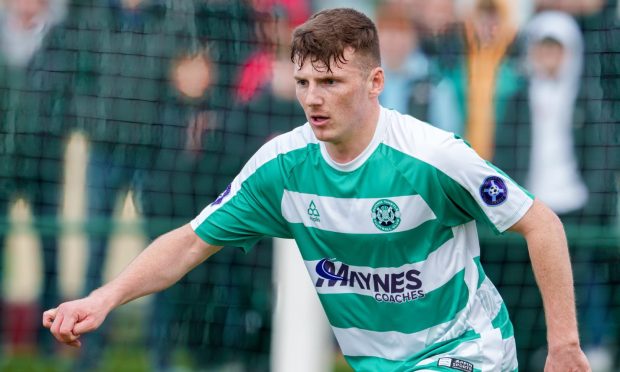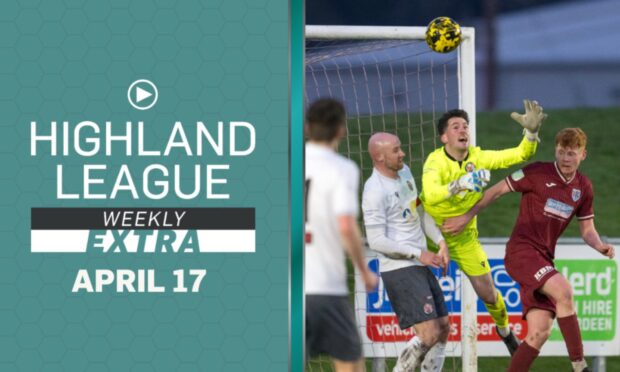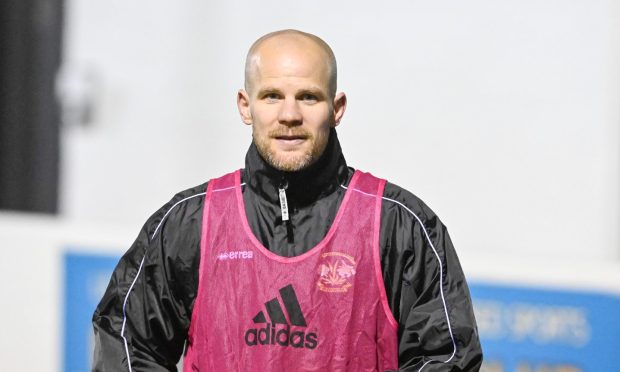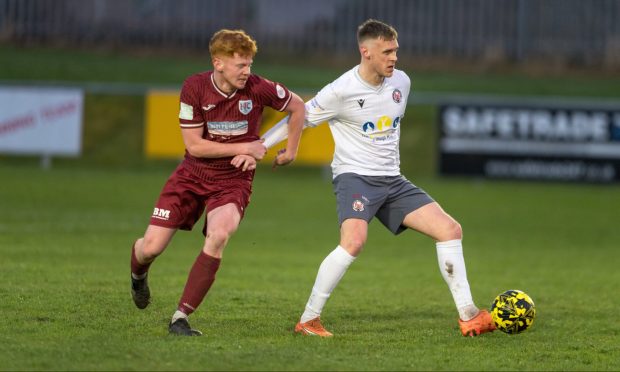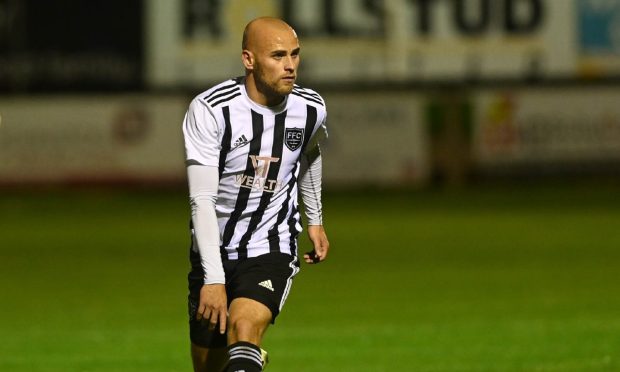A delve into boxes in the loft kick-started a lockdown project which prompted a well-travelled Highland footballer to produce a book packed with colourful anecdotes.
And the chance to help raise money for a friend who has terminal cancer was an extra motivation for Jim Oliver to write his book, which has the eye-catching title “What the XXXX Were You Playing At?”.
Thanks to the support of Niall Harkiss of Tain-based K and N Publishing, the 63-year-old has crafted chapter upon chapter of tales, which as its website superbly puts: “From Hilton to Hong Kong, Tannadice to the Wine Shed, these are the memoirs of a Highland footballer”.
Launch in Tain next month
There will be a public launch on Friday, August 20, with a signing session the next day at Platform 1864 in Tain from noon until late to allow many footballing friends from the north to share tales of their own and relive some of those written by Jim.
If you include school teams, Jim, who was born in Fearn near Balintore, had 19 clubs to his name.
In recent years, he has been the commercial manager at Caley Thistle, having been an active and valuable director at Clach, one of his many clubs.
Just some of the teams where he has displayed his goalscoring talents include Inverness Thistle, Gairloch, Clach, Rothes, Brora, Fraserburgh, Montrose, Ross County, Wigan Athletic and Hong Kong side, Ryoden.
However, his beloved Dundee United is the one club he retains more than a soft spot for and he enjoyed an unforgettable year there under the legendary manager Jim McLean.
Jim McLean exchanges led to book title
And that connection is where the title comes from.
He explained: “My mother gave me a row over the title, which required a small change, losing the letter F. I still do what my mum says so there was no argument there.
“The title came from what a certain Dundee-based manager said to me one Monday morning. He was a famous disciplinarian within Scottish football, who I’m sure your readers might well guess.
“I was often in his office on a Monday morning. He had his spies in Dundee. He absolutely shouted that phrase at me and told me that my landlady had branded me a terrorist.
“I didn’t do anything wrong. I won’t give the game away. All I will say is I should have perhaps told my landlady what I had in my wardrobe…”
‘Compulsive collector’ soon gathered gems from the loft
He wanted to leave that particular story for readers of the book and it was the boredom of furlough that led to cuttings and pictures being transformed into something tangible, which is dedicated to his family as well as dear friend Alan Ross.
Jim said: “I’m a compulsive collector of things. Be it concerts, or a football dinner, I would always keep something from the night. I would throw it into a box and when it was full it would be put up in the loft and another one started.
“During lockdown, I thought I would have a look at all these boxes, thinking there might be four or five. There was actually 10 in the loft and another five in the garage.
“I had mountains of material, so I started breaking them down – into family, business and sport. The football side of it started piling up, so I began breaking that down.
“All of a sudden, I had 15 different piles. I was then remembering some of the characters I played with and some of the managers that I played under and some of the escapades that we got up to.
“Because I was furloughed and I had so much spare time, I thought now was the time to finally write the book. I broke the back of it over the first few months and it came to a standstill before I got back into it.
“I had it all written out by the end of the year and I didn’t know what my next step should be.
“My best friend, Alan Ross, told me that he had terminal cancer. I wanted him to read it so I printed a copy of it out for him.
“He called me a few days later and he couldn’t speak for laughing. He was trying to retell me stories that I had written, but he couldn’t tell them because he was laughing so much.”
Half of any profits that the book makes will go directly to Alan’s chosen charities.
Goals up north caught attention of huge clubs down south – But Oliver ended up in Dundee
Jim scoring goals for Tain St Duthus was turning heads in the 1970s and scouts from near and far were taking notice. So much so, he secured a trial with Tottenham Hotspur.
At the same time, a local link led to him getting the chance to stop in at Dundee United. The club under Jim Maclean were assembling some top youngsters from throughout Scotland.
He explained: “Bob Bannerman of Tain, who has the Bannerman’s of Tain (transport firm), was one of the Tain St Duthus coaches.
“A fellow coach was John Jackson, who was a former Dundee United player. He had moved up to the Highlands and played a big part in my football development.
“John and Bob had got in touch with Spurs, who wanted me to go down as on trial. That was organised, but in the meantime, they fixed up a visit to Dundee United, so I could see what that was like.
“I was told not to sign anything under any circumstances at Dundee United. It was a very good first morning of training at Tannadice and Jim McLean wanted me to sign by lunchtime.
“I told him I was sorry, but I was told not to sign because I was going to Spurs. He never spoke to me for the rest of the week.”
The trip to London was packed with hope, but a simple yet bad experience as soon as he arrived at the club put him off a move to the club.
He added: “I went to Spurs and did very well and they wanted me to sign. However, when I got to London, I had been told that I should get a taxi from Euston to White Hart Lane, get a receipt and take that to the club, who would pay me back. The fare was around £7. This was in 1975.
“I told the lady on the reception desk at Spurs that I was to get my taxi fare back. She asked me how much it was and did I get a receipt. Unfortunately, I had not got a receipt and when I told her it was £7 she said that it should only be half that.
“I felt really uneasy about that and felt that she was saying that I was asking for too much. She said in no uncertain terms that it should only have cost about half of that.
“It’s amazing – that incident put me off wanting to sign for them. Imagine if that sort of thing had happened to Glenn Hoddle!
“I came home from Spurs and was preparing to go back to school. Jim McLean phoned at the end of that week and spoke to my father, asking how I got on in London.
“I spoke to him and said that London was very far away. He said Dundee is far closer and they would love to have me at United.”
So, that reopened the door to Tannadice for Jim, who had clearly impressed on Tayside.
He explained: “Jim McLean said I had got on really well with the boys, and they all spoke very highly of me. My father and mother took me down the following day and helped me get things sorted.
“It was only one season I was there for. At the end of the season, he said I needed to knuckle down and get myself properly fit and if I did that he would retain me. I said I couldn’t do that as I was homesick.
“I came back home and had no job. After a few drinks one night and decided to phone Jim McLean to ask if I could go back. I phoned his house number and he answered the phone and I put it down. I never asked him.
“People ask about regrets. Yes, things could have been different, but I am a great believer in fate.
“What’s for you won’t go by you. I have a beautiful granddaughter and had I turned a different corner back then she would never have been here.
“I know what my own son and daughter and family mean to me and I would never, ever swap that for anything.
“I wrote the book for my family, so that my grandchildren would know down the years what their grandad was like. That was the driving force behind it for me.
“If anyone is thinking about writing a book, just do it. Have it there, even if it’s just for the family.”
Part of a group at United who went on to become legends
Jim forged friendships with some of the Tayside club’s legends, who remain household names even now.
He stressed: “I went to Dundee United straight from Tain Royal Academy in 1975. There was myself and the likes of Andy Gray, David Narey, Paul Sturrock, Paul Hegarty, Hamish McAlpine, Graham Payne, John Holt, Billy Kirkwood. These were a lot of the guys who went on to win the league.
“It was brilliant to be training with all these guys and I still keep in touch with many of them. It has always been a favourite club of mine and I still supported them when I left because of who I met there.
“Looking back, I ask whether I really should have joined Dundee United at that time. I wasn’t even thinking of playing football one minute then I am sitting in a bedsit in Dundee.
“We, as a family, were reasonably well off and we lived in a nice house. So, I moved from that to sitting in digs in Dundee on my own.
“I got absolutely no help, not like players get now. There is a lot more planning and preparation goes in to signing young players who have to leave home.
“Jim McLean once asked me if I was up for playing for the first-team on Saturday against Dundee as I had done well in the mini-derby against them through the week. He asked me this in front of two other players who were desperate to play.
“Maybe it’s a Highland thing. We never push ourselves forward enough. I said ‘I don’t know’. Asked today, I know what I would have said.
“I’d have jumped at the chance. That still plays on my mind. I’d like to be in that moment, standing behind myself and kick myself to give a different answer.”
Lure of Hong Kong too much to resist
A rare idle spell in a spell-binding career threw up an opportunity far from the Highlands or Dundee when Jim was dazzled by the thoughts of making it in Hong Kong.
He said: “I went to Hong Kong, to a club called Ryoden. I had just left Montrose at the time in 1983 and I had just finished my engineering apprenticeship and I saw that Billy Urquhart, who I was with at Wigan, had been offered the chance to play in Hong Kong.
“Bill McAllister reported in the P&J that Billy had turned down the move. As I was not working and without a club, I asked Bill whether he would put my name forward, so I could be considered for the move.
“A couple of days later I got a call and I was off to Hong Kong on a one-way ticket. I got a call at 10am telling me I had to be in London that night to meet a Mr Leung outside the Loon Moon restaurant in Victoria Street in London.
“I arrived at Heathrow and asked how I got to Victoria Street, which one I was asked, which was not a good start to my trek halfway around the world. It must be the one near Picadilly, I worked out, and made my way there.”
He added: “This guy came up, asked my name, took me around the corner to a hotel after handing me an envelope and said I was booked in here for tonight and here is my British Airways ticket for 8am the next morning.
“Here I was at 10pm in London, not sure what to do. I didn’t stay in the hotel and just made my way to the airport. Next thing I am on a 14-hour flight to Hong Kong.
“When I arrived, through departures, I was just hoping someone turned up to meet me. How would I get out of here?
“Thankfully it was all brilliant for me in Hong Kong. It was only for a season and I was asked back, but I was holding out for a bit more.”
Watching the end unfold from home
However, the chance of a return there was shattered in an unusual fashion.
He added: “I was back home and there was money, wages, going into my bank account every week then it stopped. Then I discovered they had totally disbanded the team.
“One of the teams out there got relegated, a club called South China. They were one of the big two along with Hong Kong Rangers. One team was sacrificed and unfortunately it was the one I played for. There was no club anymore.”
*There are lots more stories covered in the book from his first time playing as a primary school kid to his last ever 11-a-side game for the Clach Legends. The book can be pre-ordered by going to www.jo-book.co.uk. Anyone ordering before July 31 will get an acknowledgement in the book.
